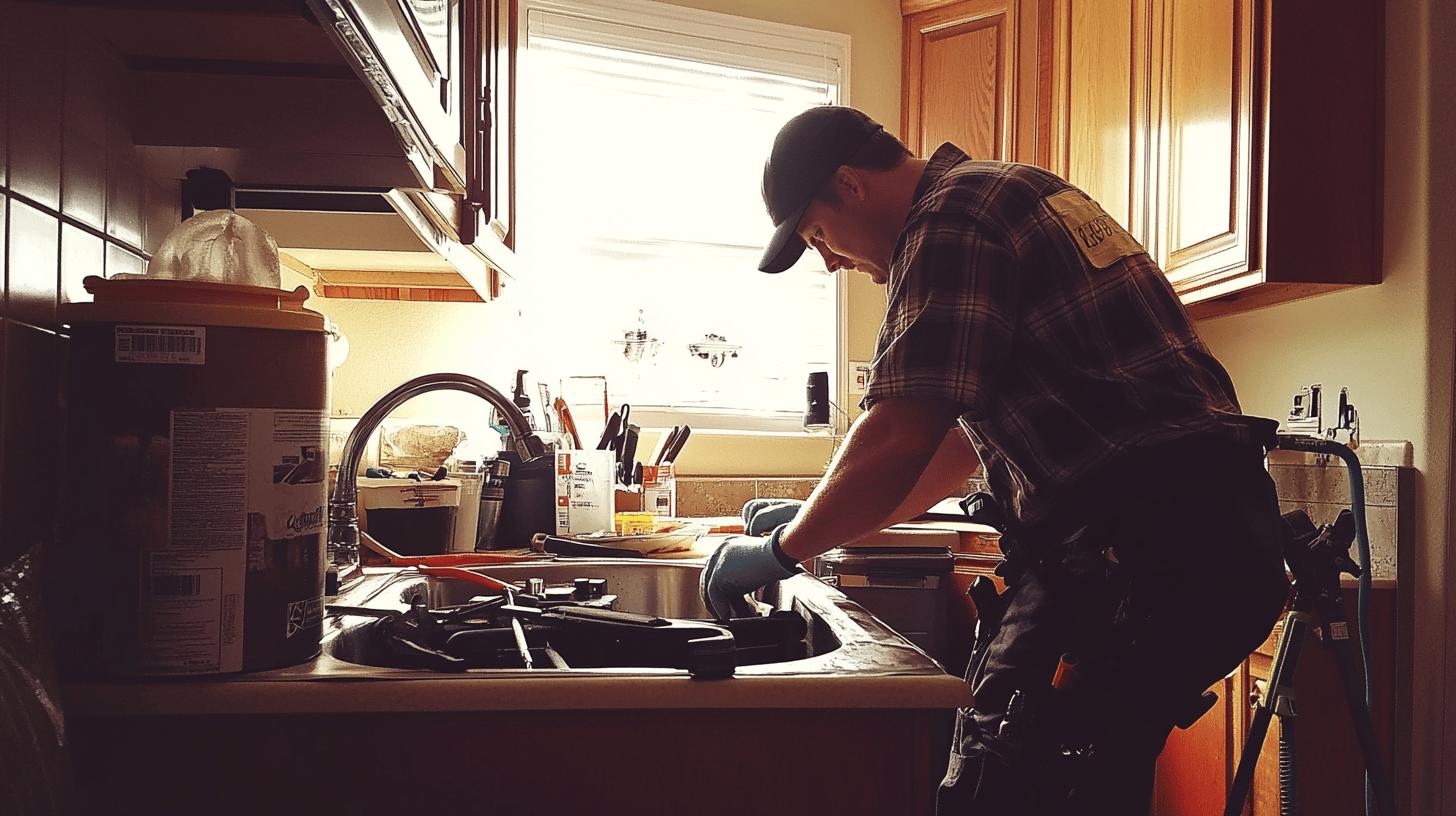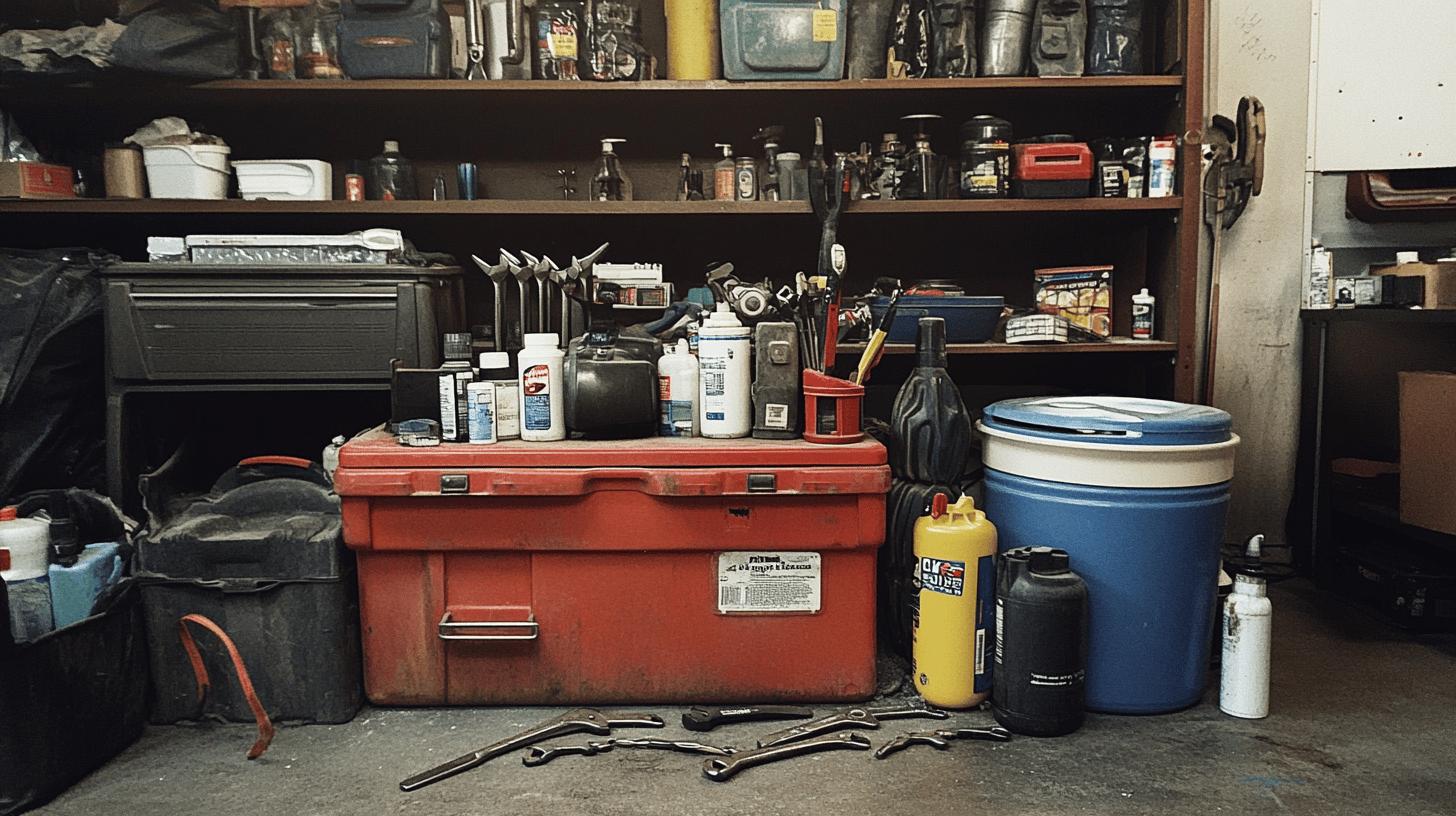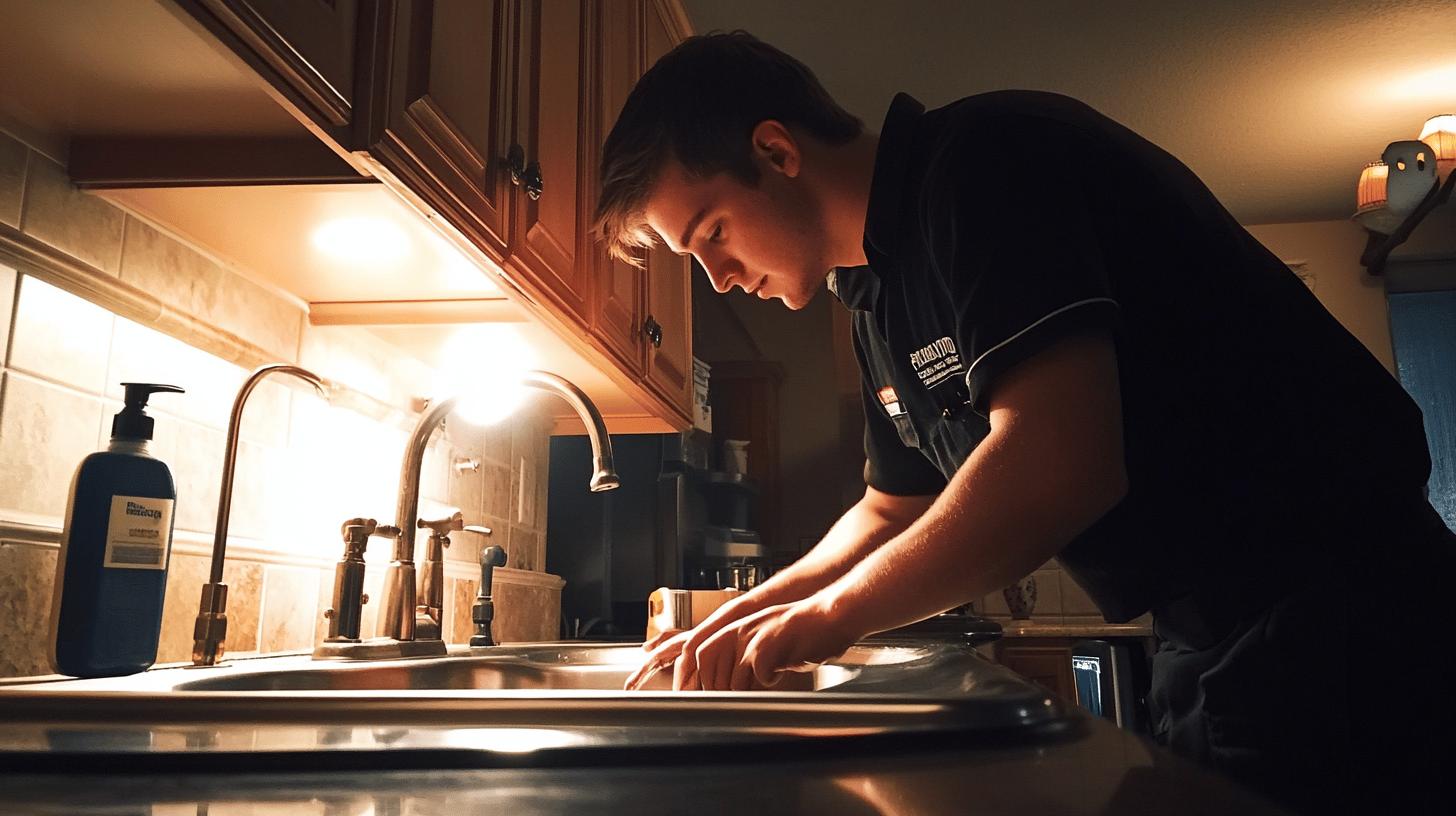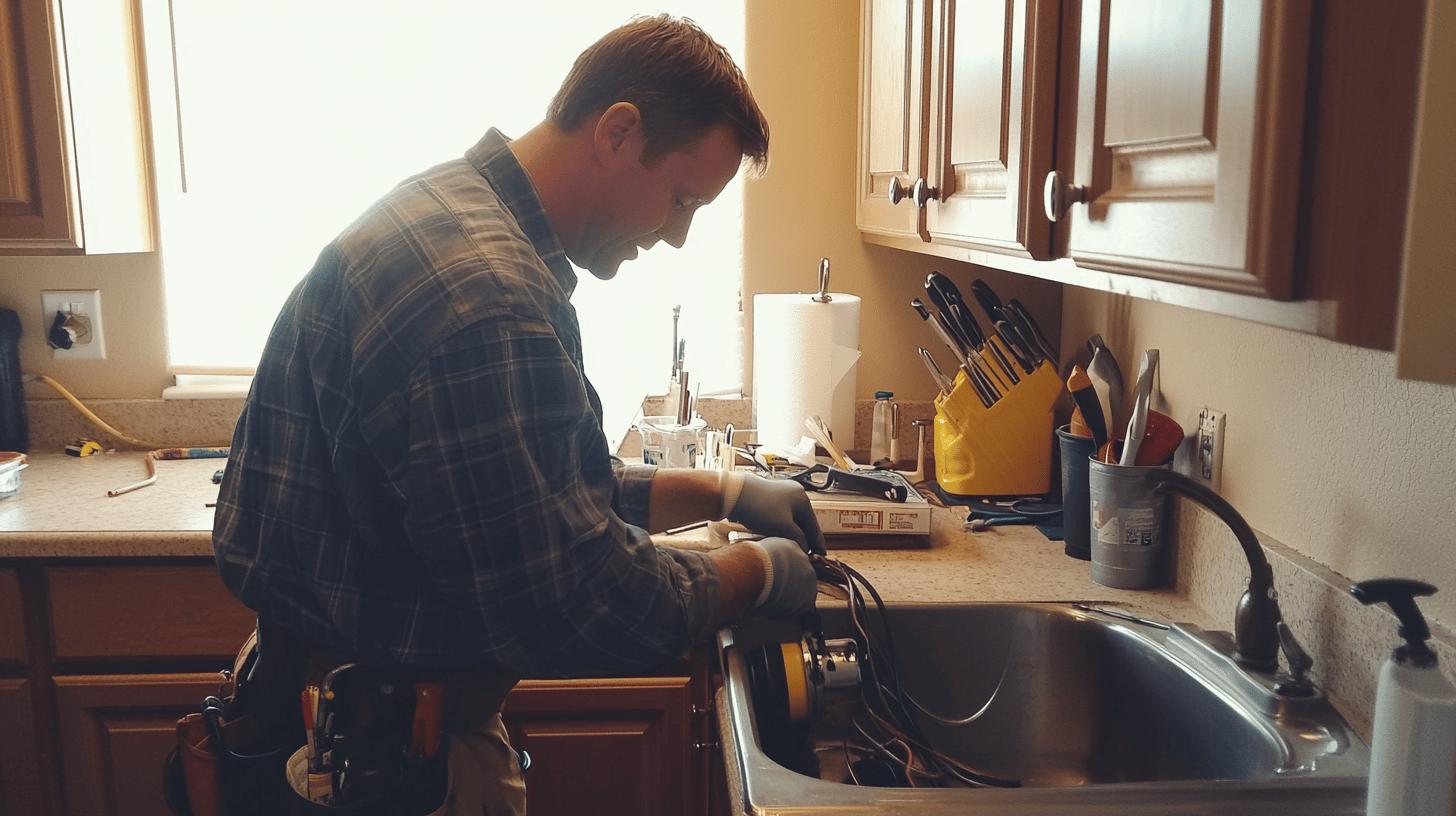TL;DR:
- Plumbing: Involves repairs, installations, and maintenance of fixtures (e.g., water heaters, toilets, pipes).
- Drain Cleaning: Focuses on unclogging slow drains with specialized tools (e.g., augers, hydro-jetters).
- Common Plumbing Issues: Leaky faucets, broken pipes, low water pressure, malfunctioning water heaters, toilet backups, sewer line issues.
- Common Drain Cleaning Problems: Clogged sinks/toilets, slow drains, sewer backups, tree root invasions.
- When to call a plumber: Installation and repairs of fixtures, burst pipes, water pressure issues.
- When to call a drain cleaner: Clogs, slow drains, hydro-jetting services.
- Preventative Maintenance: Regular inspections and cleaning prevent costly repairs and ensure system efficiency.
Ever wondered why a simple drain clog can’t just be fixed with a bottle of cleaner from the store? Or why calling a plumber isn’t always the answer? Knowing the difference between plumbing and drain cleaning services can help you figure out who to call for your needs. Plumbing covers a wide range of stuff, from installations to big repairs, while drain cleaning is all about clearing clogs and keeping things flowing. By the end of this post, you’ll know exactly who to contact to keep your water systems working smoothly.
Differences Between Plumbing and Drain Cleaning: An Overview
Plumbing covers a lot of services, like repairs, installations, and maintenance for things like water heaters, toilets, sinks, tubs, showers, bidets, urinals, and even whole plumbing systems in homes or businesses. Plumbers deal with different problems in the plumbing system, including water supply lines, gas lines, and sewage systems.
Drain cleaning, on the other hand, is all about unclogging or fixing slow drains. Drain cleaners use tools like drain snakes, augers, and hydro-jetting to remove blockages. They focus on diagnosing and fixing issues that cause water backups or slow drainage.
- Plumbing services: Installations, repairs, maintenance of water heaters, toilets, sinks, tubs, showers, bidets, urinals, and entire plumbing systems.
- Drain cleaning services: Unclogging, hydro-jetting, preventive maintenance.
- Tools used by plumbers: Wrenches, pipe cutters, sealants.
- Tools used by drain cleaners: Augers, hydro-jetters, camera inspections.
- Examples of typical issues handled by each profession: Plumbers handle water heater installations and sewer line repairs, while drain cleaners address clogged sinks and slow drains.
Deciding between plumbing and drain cleaning services depends on what problem you have. If you’re dealing with water supply issues, gas lines, or installing a new fixture, you should call a plumber. But if you have clogs or slow drains, a drain cleaner with specialized tools is the way to go. Knowing these differences helps you hire the right person for the job.
Common Plumbing Issues and When to Call a Plumber

Homeowners deal with all sorts of plumbing problems, from minor annoyances to major issues. Common problems include leaky faucets, which waste water and drive up bills, and broken pipes that can lead to serious water damage if not fixed right away. Low water pressure can make everyday tasks tough, and a malfunctioning water heater—whether it’s tankless, electric, or gas—can mess up your hot water supply.
Knowing when to call a professional plumber is key to keeping your plumbing system running well. For example, if your toilet backs up, it might mean there’s a serious blockage that needs expert help. Issues with sewer lines, like blockages or breaks, can cause bad smells and health risks. In emergencies like a burst pipe or a broken water heater, calling a plumber quickly can help fix the problem and prevent more damage.
- Leaky faucets: Persistent drips that waste water and increase utility bills.
- Broken pipes: Can cause water damage and need immediate attention to prevent further issues.
- Low water pressure: Often a symptom of underlying plumbing problems.
- Malfunctioning water heaters: Disruptions in hot water supply affecting daily activities.
- Toilet backups: Indicate severe blockages that need professional clearing.
- Sewer line issues: Blockages or breaks causing odors and potential health hazards.
Typical Drain Cleaning Problems and When to Call a Drain Cleaner
Homeowners often face drain issues like clogs and slow drains, which can mess up daily routines and lead to bigger plumbing problems if not taken care of. Frequent clogs usually happen in sinks, tubs, and toilets due to debris buildup from hair, soap scum, and food particles. Slow drains might indicate residue buildup in the pipes, which can eventually lead to complete blockages.
If you’re dealing with ongoing or serious problems, hiring a professional drain cleaner is crucial. They use specialized tools and techniques to clear blockages and keep your drainage system working well. For example, camera inspections let them find the root causes of recurring clogs and fix underlying issues. Getting a pro to help not only solves the immediate problem but also prevents future ones, saving you time and money.
- Clogged sinks: Caused by food particles, grease, and soap scum buildup.
- Slow-draining tubs: Often due to hair and soap residue blocking the pipes.
- Toilet clogs: Resulting from excessive toilet paper or foreign objects.
- Sewer backups: Indicate severe blockages or breaks in the sewer line.
- Tree root invasions: Roots infiltrate and obstruct underground pipes.
Tools and Techniques Used by Plumbers vs. Drain Cleaners

Having the right tools is essential for plumbing and drain cleaning tasks. The right equipment helps tackle problems efficiently, reducing the risk of further damage and minimizing downtime. Whether it’s a small repair or a major clog, professional plumbers and drain cleaners depend on specialized tools.
Plumbers use various tools for installations, repairs, and maintenance. Common ones include wrenches for tightening and loosening fittings, pipe cutters for clean cuts on new pipes, and sealants to prevent leaks. They also have advanced tools like pipe benders, soldering torches, and pressure gauges to ensure everything in the plumbing system works properly.
Drain cleaners have their own specialized equipment for clearing clogs and maintaining drains. Augers, or drain snakes, break up and remove blockages, while hydro-jetters use high-pressure water to clear debris from pipes. Camera inspections let them visually check for deep drainage issues and find the root causes of recurring problems. These tools help drain cleaners handle even the toughest clogs effectively.
| Tool/Technique | Plumbing | Drain Cleaning |
|————————|———————————————–|————————————————-|
| Wrenches | Essential for tightening/loosening fittings | Not commonly used |
| Pipe Cutters | Provides clean cuts for fitting new pipes | Not applicable |
| Sealants | Used to secure joints and prevent leaks | Not applicable |
| Augers | Not commonly used | Breaks up and removes clogs |
| Hydro-Jetters | Not commonly used | Clears out debris with high-pressure water |
| Camera Inspections | Occasionally used for pipe diagnostics | Diagnoses issues deep within the drainage system|
When to Hire a Plumber vs. When to Hire a Drain Cleaner
Choosing the right professional for your plumbing or drain issue is key to getting things resolved quickly and effectively. Plumbers and drain cleaners have specialized skills and tools for different problems, so hiring the right expert saves you time and money in the long run.
Call a plumber for issues with water supply, gas lines, or general pipe repairs. They are trained to install new fixtures, fix burst pipes, and solve water pressure problems. Plumbers also handle water heater installations and are crucial for major renovations involving plumbing work, making sure everything in the system runs smoothly and safely.
On the other hand, call a drain cleaner for blockages or slow drains. They specialize in unclogging toilets, clearing blocked sinks, and even removing tree roots from sewer lines. Using specialized tools like augers and hydro-jetters, they effectively clear debris and buildup in pipes. If you’re dealing with ongoing slow drains or need hydro-jetting, a professional drain cleaner is the way to go.
-
When to call a plumber:
- Installing new fixtures
- Repairing burst pipes
- Fixing water pressure issues
- Water heater installations
- Major renovations
-
When to call a drain cleaner:
- Unclogging toilets
- Clearing blocked sinks
- Removing tree roots
- Hydro-jetting services
- Persistent slow drains
Preventative Maintenance: Plumbing vs. Drain Cleaning

Regular plumbing maintenance offers numerous benefits, like catching problems before they become costly repairs. Routine inspections can identify minor leaks, corrosion, and wear, helping to extend your plumbing system’s lifespan and lower utility bills. A professional inspection each year provides peace of mind and prevents unexpected emergencies.
Preventative drain cleaning is equally important for keeping your drainage system in good shape. Regular maintenance helps prevent clogs from hair, grease, and debris. Using strainers in sinks and tubs reduces waste entering the drains. Ignoring slow drains can lead to serious blockages and water damage. Cleaning gutters and external pipes regularly also helps prevent overflow. By taking these preventative measures, you can ensure your drainage system runs smoothly and avoid costly repairs.
- Avoid disposing of hair and grease in drains
- Regularly inspect plumbing fixtures
- Schedule annual professional inspections
- Use strainers in sinks and tubs
- Do not ignore slow drains
- Regularly clean out gutters and external pipes
Final Words
When deciding between plumbing and drain cleaning services, it’s important to understand what each one covers. Plumbing deals with general water systems, installations, and overall maintenance, while drain cleaning focuses on blockages and slow drains. Common plumbing issues like leaky faucets or broken pipes usually need a plumber, while clogs and sewer backups are better handled by professional drain cleaners.
Each type of expert uses specialized tools for their tasks, such as wrenches and pipe cutters for plumbers, and augers and cameras for drain cleaners. Both play a key role in keeping your home’s plumbing system running smoothly.
Knowing the differences between plumbing and drain cleaning helps you choose the right service for your needs. Whether you’re facing a complex installation or a stubborn clog, calling the right expert can save you time and stress.
FAQ
What is the difference between plumbing and drainage system?
Plumbing includes services like repairs, installations, and maintenance for water heaters, toilets, sinks, tubs, showers, bidets, urinals, and entire plumbing systems. On the other hand, drainage systems focus on removing wastewater from your property and clearing blockages in drains and pipes.
Can a plumber clean a drain?
Yes, plumbers can clean drains using specialized tools like drain snakes, augers, and hydro-jetting equipment to clear blockages and ensure proper drainage.
Can a plumber clear a drain?
Yes, plumbers have the skills and tools needed to effectively clear clogged drains, handling both minor and severe blockages.
Are drains and pipes the same thing?
No, drains specifically refer to the pipes that carry wastewater away from fixtures to the sewer line, while pipes can transport both water and waste throughout the plumbing system.

